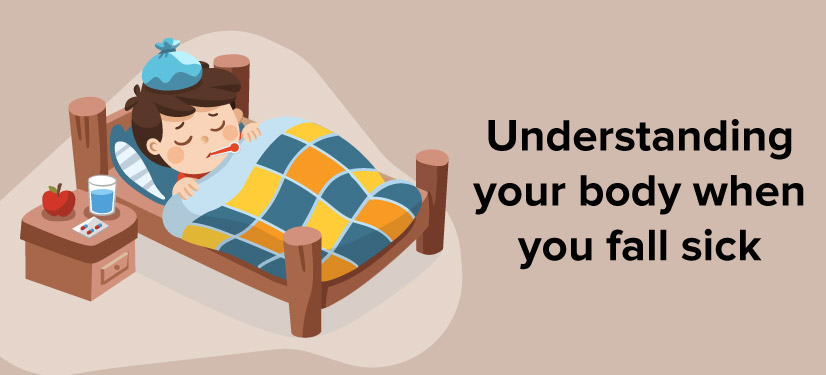Why Do We Get A Fever?

You suddenly feel warmer, you begin to shiver and sometimes you also have body aches – these are indications that you have a fever. The immediate reaction would be to check your temperature using a thermometer.
If the temperature is beyond a certain degree, you consult a doctor and get it back to normal. Normally, our temperature is around 98 degrees Fahrenheit. And then you are asked to take a lot of rest and you have to take food that is easier to digest. In a few days, along with medicines, you are back to normal.
Have you ever wondered why you get a fever, how your body reacts to it and how you get cured?
Here, we help you understand the science behind fever.
How does your body say that you have a fever?
You may have had a fever in the past and this is how your body reacts: it becomes hotter than usual. This is your body’s way of saying that something is not right.
There is an infection from a foreign particle like a virus or a bacteria, causing a rise in general heat in the body that is making you sick. These foreign particles that enter your body are called pathogens.They enter your body through different ways, such as infected food or water or even through people infected earlier with the same fever.

Your body becomes hot and the thermometer shows the increase in heat
When the pathogens enter the body, how does your body recognise these stranger bodies?
Enter the white blood cells – let’s call them immunity heroes. They secrete a substance called pyrogen. This increases the temperature of the body to such an extent that the infecting particles are killed. These viruses and bacteria can survive and multiply in a normal-temperature body. However, they die in a body whose temperature is higher than normal.
Why do you need medicine to treat fever?
Think about it: if the body responds to the infection-causing bacteria by helping the immunity heroes kill them, why do we have medicines to reduce the temperature?
Sometimes, the virus or bacteria don’t exit your body even with the help of the blood cells. You need medicines to help these white blood cells fight the infection in the body. That’s when doctors give you medicines or injections to help you get better.
What are the other symptoms that you may have?
Depending on what causes your fever, you may experience the following symptoms. According to reputed health experts and research, symptoms can be as follows:
- Excess sweat
- Chills and shivering
- Headache
- Muscle aches
- Lack of hunger
- Irritability
- Dehydration
- General weakness
These are what you will commonly experience. In some instances, you may also have a fit. In that case you may need to visit the doctor immediately.
How to prevent getting a fever?
You can treat normal fever at home, having plenty of fluids, finding ways to reduce the body temperature, probably popping pills and taking good rest.
And you need to take sufficient care so that your fever doesn’t become worse. Please note that these ways work only when your temperature is under 100 or 101 degrees Fahrenheit. It’s best to check with your doctor if the temperature exceeds 100 degrees Fahrenheit. If you have a fever that exceeds the temperature and if you feel feverish beyond three days, you need to visit the doctor.

Keep checking the temperature often.
While we are listing the ways you can overcome your fever, NOT having a fever is better, right? Here are some simple tips that you can follow to prevent fever:
- Wash your hands often, especially before eating, after using the toilet, and after being in a crowd.
- Carry hand sanitizers or antibacterial wipes.
- Cover your mouth when you cough and your nose when you sneeze.
Be extra careful during times like these when a fever can be an indication of coronavirus infections. It’s also the general flu season when you need to be on the lookout for these symptoms and be careful while talking to people.
Now that you know why we get a fever and how to prevent it, can you tell us how you can tell covid infections and normal fever apart? Share your answers in the comments.
Liked this blog? Read more